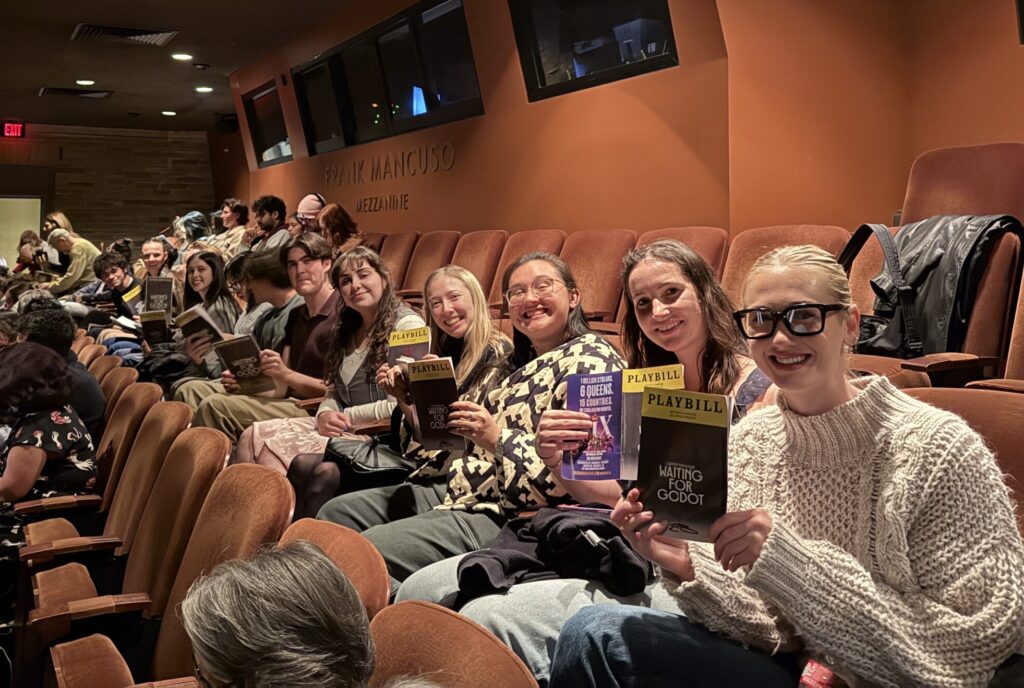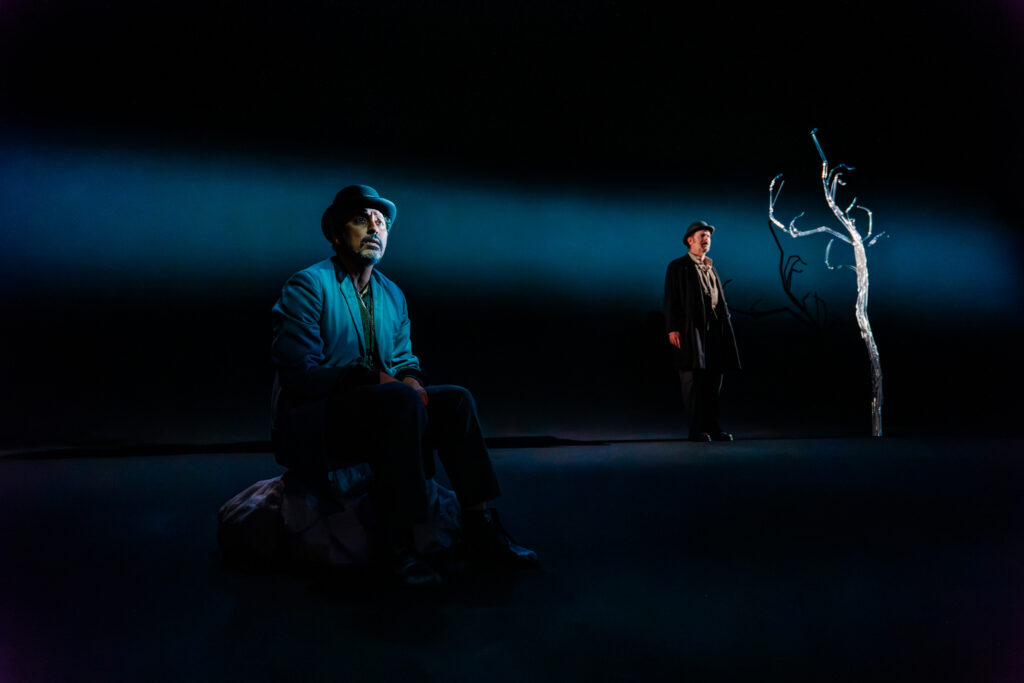For Colleen Jaurretche’s students, ‘Waiting for Godot’ comes to life

Colleen Jaurretche/UCLA
Students attending a Geffen Playhouse production of “Waiting for Godot.”
| December 11, 2024
Samuel Beckett’s “Waiting for Godot” is often described as a cornerstone of modern theater.
The play, with performances at the Geffen Playhouse running through Dec. 21, invites audiences into a minimalist world where two characters, Vladimir and Estragon, wait endlessly for a mysterious figure named Godot. Instead, they encounter other seemingly random characters and each other’s philosophies.
Through its sparse dialogue, cyclic structure and profoundly existential undertones, “Waiting for Godot” challenges traditional storytelling conventions, offering a meditation on time, purpose and the human condition.
Colleen Jaurretche has been teaching UCLA students about Beckett (and other challenging Irish authors) for years. She’s also a longtime theatergoer and supporter of the arts. This year, she jumped at the chance to give her students the experience of Godot at its most intentional in the shared darkness of a theater, watching seasoned performers, including Rainn Wilson (“The Office”) and Aasif Mandvi (“The Daily Show”) in the lead roles, embody the language and spirit of this remarkable work in a high-level live production.
It’s something she wishes could happen more often.
“It’s rare that we have an opportunity like this to go see professional work,” Jaurretche said of the production. “We need more top-tier live theater, and we need both new and canonical works. Sometimes I have students in my class who have never experienced live theater, let alone something as complex and mysterious as ‘Godot.’”
The Geffen Playhouse’s production of “Godot” was Isabel Rodriguez’s first experience with theater. Directed by Judy Hegarty Lovett, who has helmed 23 Beckett productions for Irish theater company Gare St. Lazare Ireland, it made a lasting impression on the UCLA senior honors student who is studying English. Seeing the play live helped solidify the feelings that reading the text had already instigated — but in a way that held her attention span much more vividly, she said.
Moments that stand out from the page
“I think the performance really worked to create a feeling of discontent,” she said. “I think it was directed and delivered exceptionally well by everyone who contributed to the production. And then, even just the music that played in the background was pretty haunting, which I believe also [contributed] to that feeling as well.
“There’s no sense of relief for the audience because there’s no sense of relief for the characters, or at least Vladimir, specifically, who I deemed to have a better understanding of the situation at the end in comparison to Estragon,” she added.
Krish Aditya, a fourth-year English major who has directed and produced works during his time at UCLA, said the best part of seeing a professional production is the little moments that stand out from the page, like the exacting stage instructions the author includes in his work.
“It’s a play that’s a lot funnier when you’re watching it,” he said. “Beckett’s style of writing is very subtly funny, and it takes a really good director and really good actors to bring out a lot of the humor. They’re able to turn things into a very surprising or just straight up funny physical moment or add in lots of really long comedic pauses and just play with the language.”

Aasif Mandvi (left) and Rainn Wilson in “Waiting for Godot” at the Geffen Playhouse.
Aditya said he appreciates studying authors like Beckett and how Jaurretche uses them to challenge her students to upend their expectations and practices.
“Usually, in the English major, you’re looking for one-to-one meaning in a piece of literature,” he said. “And that’s something that just kind of immediately goes out the window with these writers. It’s more just like turning off your brain and just … experiencing. Something like ‘Waiting for Godot’ is so minimalist and weird and not very outwardly meaningful. Learning to experience that has been a lot of fun because even though the text is challenging, when you kind of learn to just turn off your brain in a way and just get into the sensation of the language, it becomes a really cool experience.”
Making challenging work come alive
Sometimes people can find the works in Jaurretche’s course (edgily titled “Funny as Shite: Samuel Beckett and Flann O’Brien”) rather inaccessible at first read, the continuing lecturer said. But toward the end of the course, when she starts teaching “Godot,” is where the class really comes together.
“It’s arguably one of the toughest classes I teach,” Jaurretche said. “It’s about half-prose, half-drama, and one of the tricks for making Beckett come alive is trying to convey not only the philosophical underpinnings of the work, but, in my view, some of the humor and the way he uses the physical body and sort of outrageous scatological humor to underscore the human condition.”
Jaurretche will be teaching courses on Beckett and James Joyce in Dublin this summer for a small group of intrepid literature lovers.
“Our students are very smart, very committed and have an appetite for intellectual adventure,” she said. “I think Beckett, like Joyce before him, comes bearing a reputation for difficulty, but what always amazes me about our students is everybody always rises to the challenge. I had the pleasure of teaching Ulysses for a course in the writing program for non-English majors, and they were remarkably talented readers of the book.”
Most importantly, Jaurretche said, these books, works and plays are an important part of our collective heritage.
“Because their stamp has been so huge, their relevance is absolutely fresh and continues,” she said.
Beckett was writing “Godot” in the wake of horrific experiences during World War II, she pointed out.
“He was writing from a place of deep compassion for suffering, for pain, for people who are oppressed, who were experiencing authoritarianism and fascism,” she said.
